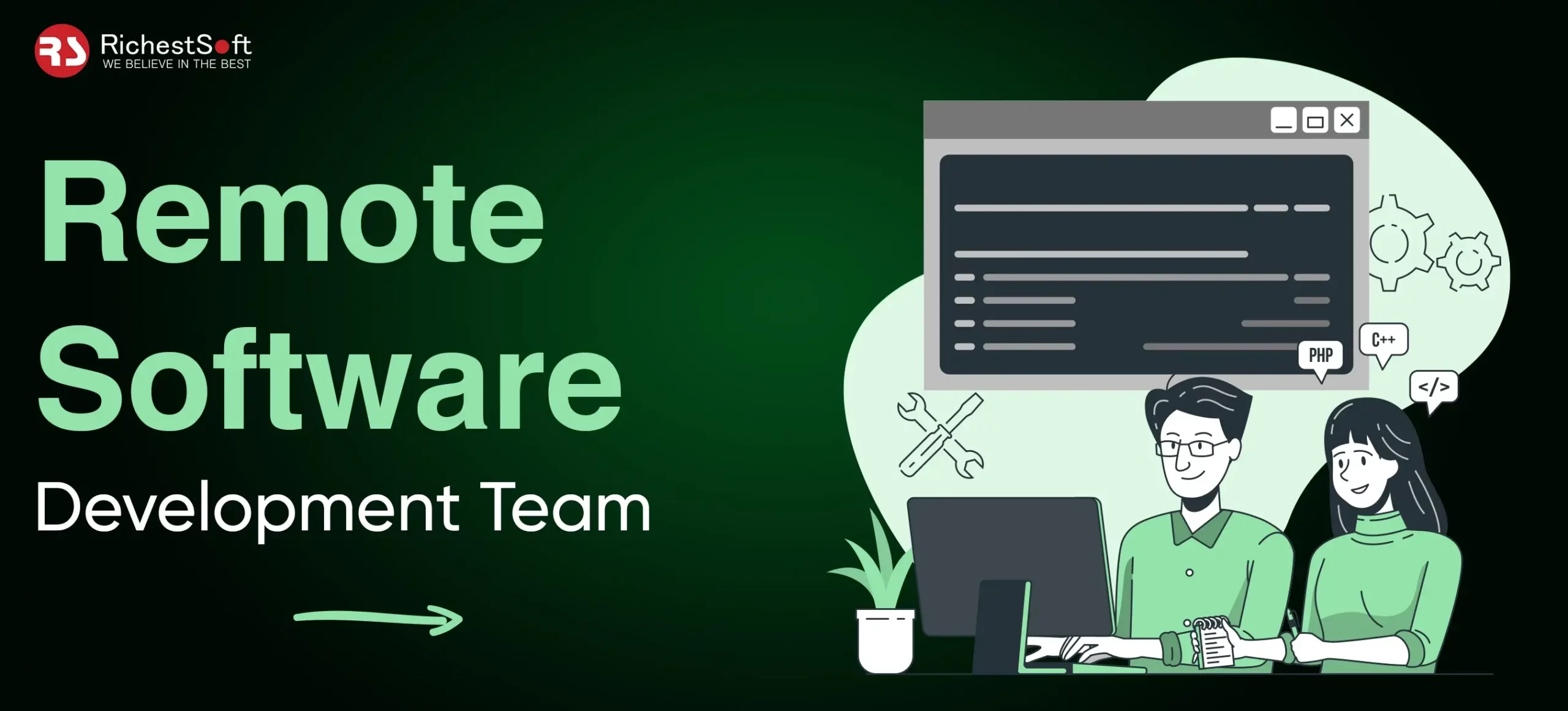October 16, 2024
For years software development has been included as an essentiality for entrepreneurs looking to stand out with their business across the globe.
For years software development has been one of the essential concepts for businesses looking to develop effective software to stand out in the online market.
And specifically when it is about hiring a remote software development team.
However, hiring remote developers comes with a few obstacles, or doubts. Whether as an entrepreneur you have come across this hiring experience or it is new to you, it is actually complicated to invest extra time, money, and resources to deal with these tricky talents.
After all, you might struggle with whether it’s worth to hire a remote software developer from anywhere in the world. And if so, which countries own the best reputations for remote developers?
So, in case you are fenced with the delusion, you are on the right track. Let’s have an in-depth understanding of hiring remote software engineering teams.
Keep reading!

Structure of Remote Software Development Team
Before beginning with anything it is essential to have an understanding of the remote software development team.
See the structure of remote software development team:-
- Project Manager
- Scrum Masters
- Development Teams
- Quality Assurance Team
- User Experience (UX) Creators
- DevOps Engineer
Below we are sharing the remote software engineering team structure that will help you get standing-out software:
1. Project Manager
The Project Manager serves as the linchpin of the remote software development team. They oversee the entire project from inception to completion.
Their primary responsibility is ensuring the project aligns with the client’s objectives and meets to the defined timeline. They are the central coordinators, facilitating communication between various teams such as development, quality assurance, and UX design.
The Project Manager is also responsible for managing the project’s budget, scope, and resources, making adjustments as needed to keep the project on track. Their role is essential, in navigating challenges, mitigating risks, and ensuring that the project delivers the intended value.
2. Scrum Masters
Scrum Masters play an essential role in driving the Agile development process within the remote team. They are tasked with ensuring that the team follows Scrum principles, which promote flexibility, collaboration, and continuous improvement.
By leading daily stand-ups, sprint planning, and retrospectives, Scrum Masters help the team stay aligned on goals and identify any blockers that may hinder progress. Their role is to remove these impediments, whether they are technical, procedural, or interpersonal, to maintain a smooth workflow.
Scrum Masters are also responsible for fostering an environment of transparency and accountability, ensuring that the team consistently delivers high-quality work.
3. Development Teams
The software development teams are the backbone of the remote software development structure, responsible for the actual creation and implementation of the software.
These teams consist of both front-end and back-end developers who work together to build the software according to the project’s specifications. They employ a variety of programming languages and frameworks, following coding standards and best practices to ensure code quality and maintainability.
Developers regularly commit code to the repository, engage in code reviews, and collaborate with other teams to integrate their contributions effectively. Their ability to work cohesively in a remote environment is critical to the success of the project.
4. Quality Assurance Team
The Quality Assurance (QA) Team is dedicated to maintaining the integrity and functionality of the software by conducting rigorous testing.
They are responsible for executing various types of tests, such as unit, integration, system, and user acceptance tests, to identify any defects or areas of improvement.
The QA team works closely with developers to reproduce and fix bugs, ensuring that the software meets predefined quality standards before it is released.
Their meticulous approach helps in delivering a reliable, stable, and user-friendly product, which is essential for client satisfaction and the software’s long-term success.
5. User Experience (UX) Creators
User Experience (UX) Creators focus on designing the interface and overall experience of the software, making it both functional and aesthetically pleasing. They conduct user research to understand the needs and preferences of the target audience, which informs their design decisions.
By creating wireframes, mockups, and prototypes, they provide a clear vision for the development team to follow. UX Creators work closely with developers to ensure that the final product not only meets the functional requirements but also delivers a seamless and engaging experience for the end-users.
6. DevOps Engineer
DevOps Engineers are responsible for managing the infrastructure and ensuring that the software is deployed reliably and efficiently.
They implement and maintain continuous integration and continuous deployment (CI/CD) pipelines, which automate the processes of building, testing, and deploying the software.
This automation helps to minimize errors and reduce the time to market. DevOps Engineers also work on optimizing the software’s performance, scalability, and security in the production environment.
Their expertise ensures that the software can handle real-world demands and that updates can be rolled out smoothly without disrupting the user experience.
Hire A Remote Software Development Team In 7 Easy Steps
So, hiring a dedicated software developer is not difficult at all, you just need to understand some considerations and steps to hire a dedicated team.
Here are some considerations to hire a dedicated remote software engineering team.
1. Identify Your Project Needs
Before you begin with the hiring process it is essential to identify the specific requirements of your business & project. Analyze the type of developers you need, the technologies they must be proficient with, and the experience level required. This step will significantly streamline the subsequent hiring process as you’ll know exactly what to look for in a candidate.
2. Make Use of Online Hiring Platforms
Several online platforms are specifically designed to make the process easy and simple. Sites such as Upwork, GitHub, and many other recruitment sites include multiple talented developers across the world.
Such platforms allow businesses to review portfolios, conduct interviews, and even run trial tasks to explore the developer’s skills before hiring them.
3. Include a Rigorous Screening Process
Once you have multiple potential candidates for your business needs, implementing the rigorous screening process will enable you to hire the best fit for your business needs. This process includes technical tests, reference checks, and behavioral interviews. however, be careful while conducting this step, the quality of your software development team depends here.
4. Ensure Communication with Clarity
When working with a remote software engineering team it is essential to set clear and effective communication. Ensure you have a strong communication system that enables seamless collaboration between you and the remote software developers you hire. You can use Slack, zoom, or Google Hangouts tools for a real-time conversation.
5. Establish a Secure Payment System
Here comes the next step— establishing a reliable payment system. This step is extremely essential as different countries have different payment systems.
Therefore ensure you choose to incorporate the payment method that is reliable for both parties. In fact, you must establish clear terms regarding work hours, project deadlines, and payment rates to eliminate any future deadlines.
Benefits To Hire a Remote Software Development Team
Baffled with doubt, how can hiring remote software be advantageous? No worries! Here are some of the points that showcase the benefits of hiring a remote software development team:
1. Access to a Global Talent Pool
One of the most significant advantages of hiring remote developers is the ability to access a global talent pool. Accessibility is not limited by any particular business, businesses can find the best talent regardless of location. This increases the chances of finding developers with the exact skills and experience you need.
2. Cost Savings
If you are looking to hire a remote software development team, you are opening a way to substantial cost savings. You can reduce or eliminate expenses related to office space, utilities, and other overhead costs. Additionally, depending on the location, developer costs might be lower. This allows businesses to get high-quality work at a more affordable rate.
3. Increased Productivity
Remote software developers often have work flexibility during their most productive hours. Without being distracted by the typical office environment, many remote workers can focus accurately and deliver high-quality work more effectively.
4. Flexibility and Scalability
Hiring a team of remote developers offers greater flexibility and scalability. You can quickly scale your team up or down based on project needs without the logistical challenges of bringing on in-house staff. This is specifically worthy for businesses with fluctuating workloads.
5. Reduced Office Politics
Hiring remote software developers minimizes office politics and distractions. This results in a more productive & harmonious work environment. With fewer chances for interpersonal conflicts and distractions, remote developers can focus better on their tasks.

Cost To Hire A Remote Software Development Team
So, while you are fenced to hire a remote software development team, it’s time to have an understanding of the investment you need to make to hire a remote software team. Here is a detailed understanding of their cost.
The cost to hire a remote developer can vary widely based on several factors including their location, experience, skill set, and the complexity of the project.
Here’s a breakdown of the factors:
Factors Influencing the Cost to Hire Remote Software Development Team
Factors influencing the cost to hire a remote software development team include geographical location, experience and expertise, and the type of contract.
These elements play a key role in determining the overall cost of hiring skilled remote software developers.
🡆 Geographical Location
- North America and Western Europe: Developers in these regions tend to have higher rates due to the higher cost of living and demand. Businesses can expect the cost anywhere from $50 to $150 per hour.
- Eastern Europe: Countries like Ukraine, Poland, and Romania provide highly skilled developers. This may cause the cost to be at more competitive rates, typically ranging from $30 to $60 per hour.
- Asia: India, the Philippines, and other Asian countries are renowned for providing remote software developers with more affordable rates, often between $25 to $50 per hour.
- Latin America: Countries for example Brazil, Argentina, and Mexico also offer competitive rates for providing remote software engineering teams, typically ranging from $25 to $60 per hour.
🡆 Experience and Expertise
- Junior Developers: With 0-2 years of experience, junior developers usually charge on the lower end of the spectrum. Rates can be as low as $15 per hour in some regions.
- Mid-Level Developers: With 2-5 years of experience, mid-level developers tend to charge moderate rates, generally between $30 to $75 per hour.
- Senior Developers: With over 5 years of experience and specialized expertise, senior developers can command higher rates, often between $75 to $150 per hour or more, depending on their location and the technologies they specialize in.
Type of Contract
- Freelancers: Hiring freelancers as your remote software developers is cost-effective for short-term projects. The charges can vary widely but tend to be on a per-hour or per-project basis.
- Full-Time Remote Employees: Hiring full-time remote developers involves a monthly salary. This can range from $2,000 to $10,000+ per month depending on the factors mentioned above.
- Outsourcing Agencies: These agencies provide developers at a high rate. However, the software development outsourcing company also handles administrative tasks and provides additional resources. Their provided remote software developers’ costs can be higher for the freelancers.
Additional Costs to Consider Remote Software Development Team
When building a remote software development team, consider additional costs like recruitment, onboarding, tools and software, management coordination, and benefits and perks.
These additional factors significantly impact the overall remote software developers budget.
1. Recruitment and Hiring Costs
Advertisements of job postings, recruitment agency charges, and the time invested in interviewing and evaluating candidates can influence the initial cost of hiring top remote software developers.
2. Onboarding and Training
Investing time and resources in onboarding and training new remote developers ensures they are well-integrated into your team and understand your project’s requirements.
3. Tools and Software
Providing required tools, software licenses, and collaboration platforms for remote software developers can also have a big influence on the overall cost.
4. Management and Coordination
Effective management of remote software development teams often includes dedicated project managers or team leads. This can increase the overall cost.
5. Benefits and Perks
Providing advantages for example health insurance, paid time off, and other perks can help in attracting and retaining top expertise. But it can also impact the total expense.
So, these these some factors influencing the hiring cost. However, you can explore more on the cost of hiring a software developer.
Example Cost Breakdown of Remote Software Developers
For example, let’s assume you’re hiring a mid-level developer from Eastern Europe and a senior developer from North America. The level of expertise and location varies so badly on the cost of hiring remote software developers.
Here is the shared information:
Mid-level Remote Developer from Eastern Europe
- Hourly Rate: $40 per hour
- Monthly Rate: $40/hour 160 hours (approx.) = $6,400 per month
For a Senior Developer in North America
- Hourly Rate: $100 per hour
- Monthly Rate: $100/hour 160 hours (approx.) = $16,000 per month
Conclusion
Overall, hiring remote software developers provides several advantages, including access to a global talent pool.
When choosing a reliable partner to get your remote software development team, RichestSoft is the best software development consulting company that stands out due to its extensive talent pool, flexible engagement models, expertise, and commitment to quality.
Building a strong remote development team with RichestSoft ensures businesses have access to top-tier talent, advanced collaboration tools, and comprehensive project management.
These advantages allow you to focus on achieving your business goals while RichestSoft handles the complexities of remote team management.

 +1 315 210 4488
+1 315 210 4488 +91 99888 06489
+91 99888 06489






